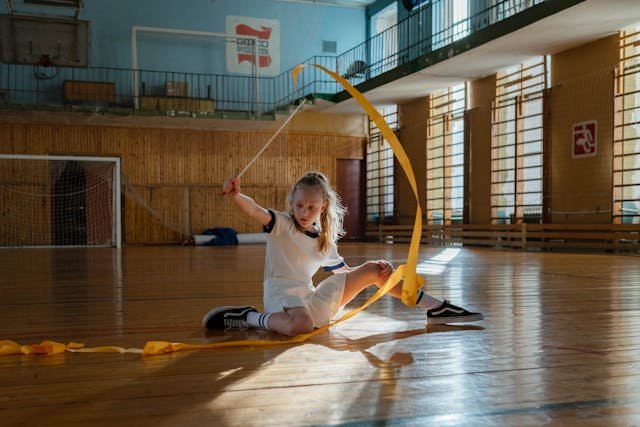
Physical Education (PE) serves as more than a simple recess from the classroom; it is a vital element of a child’s educational experience. Its influence extends beyond physical health, significantly contributing to a child’s overall personal development. PE fosters the growth of well-rounded individuals by supporting their mental, social, and emotional wellbeing alongside physical fitness.
Through a variety of engaging activities, sports, and exercises, PE creates an environment where children acquire essential life skills. In a world that increasingly promotes sedentary behaviors, the value of physical education is paramount. Let’s explore how PE plays a crucial role in a child’s personal growth and development.
1. Building Confidence and Self-Esteem
A significant benefit of PE is its impact on a child’s confidence and self-esteem. By facing physical challenges and achieving personal milestones, children learn to recognize their capabilities, pushing their limits and discovering their potential. Whether it’s excelling in a new sport or improving their running speed, each success enhances their self-esteem. This empowerment through physical activity instills the values of perseverance and self-belief, skills that extend well beyond the playground.
2. Enhancing Academic Performance
The advantages of PE also reach into the academic realm. Collaborating with a K-12 physical education teacher, especially one pursuing an online master’s in physical education, can offer numerous benefits. Their training allows them to implement flexible teaching methods and technology to meet diverse learning needs.
This expertise equips them to create PE programs that not only promote physical fitness but also enhance concentration, memory, and classroom behavior. As they apply their advanced knowledge, students gain from an engaging physical education curriculum aligned with their learning and personal development, contributing significantly to their academic success.
3. Developing Social Skills
PE acts as a social classroom, where children learn to interact effectively with their peers. Through team sports and group activities, kids discover the importance of communication, teamwork, and mutual respect. These experiences are essential, forming the groundwork for strong interpersonal skills. The ability to collaborate and lead is nurtured on the field, equipping children for success in every aspect of life.
4. Promoting Healthy Lifestyle Habits
Regular physical activity teaches children the significance of health and exercise. This early introduction to fitness and the joy of movement fosters lifelong habits that promote enduring health and reduce the risk of lifestyle-related diseases. The lessons learned in PE regarding fitness and well-being are critical in an age where sedentary lifestyles are increasing.
5. Instilling Discipline and Responsibility
Engagement in PE encourages children to develop discipline and responsibility. They learn to adhere to rules, manage their time for activities, and take charge of their health and growth. This discipline reaches beyond the gym or field, positively influencing their academic tasks and personal commitments. The responsibility associated with preparing for classes and tracking their progress teaches the importance of commitment and self-management.
6. Boosting Mental Health
PE significantly enhances children’s mental health. Regular physical activity is known to alleviate stress, anxiety, and depression symptoms. The endorphins released during exercise naturally elevate mood, helping children feel happier and more relaxed. Additionally, participation in sports provides a sense of belonging and fosters friendships essential for emotional support and mental well-being. Through PE, children learn resilience, finding joy in physical activity and discovering positive ways to face life’s challenges.
7. Fostering a Sense of Achievement
Physical education offers a unique platform for children to set goals and achieve them. Whether it’s improving their sprinting time, learning a new gymnastics routine, or mastering a tricky soccer move, the fulfillment that follows these successes is invaluable. This sense of achievement encourages a growth mindset, prompting children to take on challenges and view setbacks as opportunities for learning. The confidence gained from accomplishments in PE translates into other areas of their lives, motivating them to approach academic and personal challenges with determination.
8. Teaching Respect and Sportsmanship
One of the most profound lessons in PE is the importance of respect—toward oneself, peers, and the integrity of the game. Through team sports and individual activities, children learn to celebrate victories with humility and accept defeats gracefully. This understanding fosters resilience, empathy, and integrity. Learning to value the abilities and contributions of others, regardless of the outcome, prepares children for the collaborative environments they’ll encounter in the future.
9. Encouraging Risk-Taking and Resilience
PE encourages children to venture beyond their comfort zones and take calculated risks—whether trying a new sport, leading a team, or performing in front of others. These experiences are crucial for developing resilience, teaching children how to handle fear, failure, and uncertainty. They learn that setbacks are temporary and that perseverance and bravery facilitate growth and success. The resilience developed in PE becomes an integral part of their character, empowering them to tackle life’s challenges with confidence.
Conclusion
Physical Education is a vital facet of personal development, contributing more than just physical benefits. It nurtures the mental, emotional, and social dimensions of a child’s growth, evolving them into confident, healthy, and resilient individuals. The diverse experiences offered in PE teach children essential life skills like teamwork, discipline, and perseverance, shaping their responses to life’s challenges. It is our collective responsibility—as educators, parents, and community members—to champion comprehensive physical education programs. By doing so, we ensure that our children receive the foundation required to thrive in all areas of their lives, both now and in the years to come. Physical education transcends being just a school subject; it represents a crucial investment in our children’s future.







